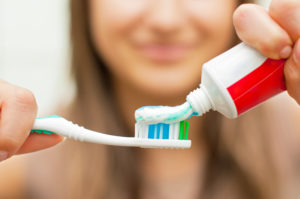 You’re serious about caring for your teeth and gums, which is a good thing, but your dentist says that some of your efforts could actually be counterproductive. If that seems a little confusing, then keep reading as 5 habits are highlighted that could be harmful to your teeth and gums. Learn about them so you can make the necessary adjustments and enjoy the best in oral health for years to come!
You’re serious about caring for your teeth and gums, which is a good thing, but your dentist says that some of your efforts could actually be counterproductive. If that seems a little confusing, then keep reading as 5 habits are highlighted that could be harmful to your teeth and gums. Learn about them so you can make the necessary adjustments and enjoy the best in oral health for years to come!
Habit #1 – Brushing Too Hard
You’ve probably heard the old saying, “Give it some elbow grease,” which refers to applying more pressure to see better results. While it may work well in certain situations, this strategy isn’t the route to take for cleaning your teeth.
Although the enamel that comprises the outer surface is hard and durable, there are activities that can compromise it over time. Brushing hard is one of them, as it can eventually wear down the material and leave your tooth susceptible to bacteria infiltration.
Habit #2 – Using a Toothbrush Past the Expiration Date
You may be thinking, “I didn’t know there was an expiration date on a toothbrush.” If so, don’t feel bad because it’s not necessarily common information that you should replace your toothbrush every 60 to 90 days.
The reason behind this is bacteria accumulate in the bristles over time, and they can then re-enter the mouth to contribute to tooth and gum decay. If, however, you’ve been sick, and you’ve had the toothbrush for less than 60 days, you should still discard it for a new replacement to prevent the sickness from returning.
Habit #3 – Brushing Too Soon After a Meal
In your attempt to prevent bacteria development, you may be eager to brush your teeth immediately after eating a meal. It may come to a surprise to know that this could be detrimental to your teeth.
The reason is when you eat, digestive acids temporarily bathe and weaken your enamel. Thus, brushing your teeth immediately after eating can become more of an attack than a preventive method.
As a general rule, wait around 30 minutes after eating to perform oral hygiene.
Habit #4 – Failing to Clean Your Tongue
To brush and floss your teeth without cleaning your tongue is counterproductive. The reason is your tongue easily comes in contact with every portion of your oral cavity. Therefore, if it’s soiled, it will leave deposits throughout your mouth.
To prevent this from happening, be sure to brush your tongue carefully after cleaning your teeth.
Habit #5 – Using Hard Bristles to Brush Your Teeth
Just as important as using light pressure to brush your teeth is to avoid the usage of a toothbrush with harder bristles. While it may seem like a viable way to remove more debris from your teeth, the fact is the possibility of damaging your enamel is not worth it.
Instead, rely on the usage of excellent technique and be patient in your efforts. By taking this route, your teeth and gums will be protected, and you won’t have to worry about any undesirable damage.
Then, to follow-up and make sure that you’re on the right track with all your oral hygiene efforts, be sure to visit a local dentist for preventive care.
About the Author
Dr. Asra Javeed is a graduate of the Boston University School of Dental Medicine. As part of her commitment to helping her patients achieve the best in oral health, she emphasizes patient-education and the importance of preventive care. Dr. Javeed practices at Smile Care, and she can be reached for more information through her website.

